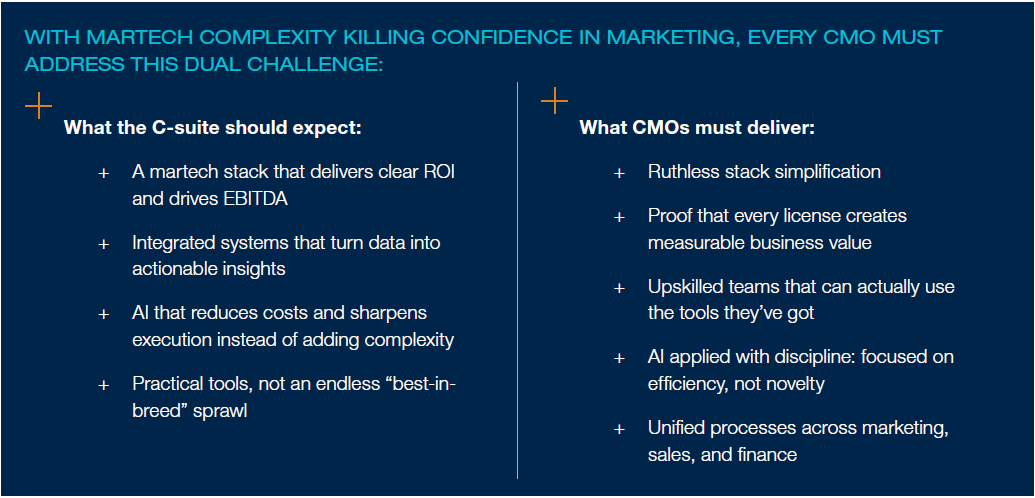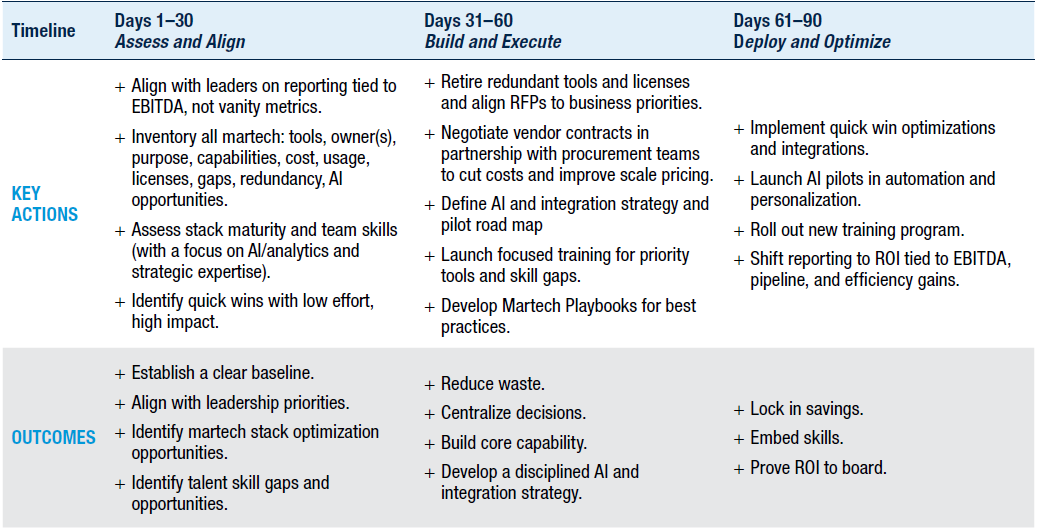You’re Wasting Money on Your Martech. Win Back C-Suite Trust by Taking Control of Your Stack.
Marketing has lost the benefit of the doubt. 65% of CEOs don’t trust their CMOs.[1] It’s time to shake things up. And the martech stack is the most visible, most expensive, and most underperforming piece of the puzzle.
Meet the new CMO. On day one, they think the job is about vision. It’s really about survival. Before they can settle in, the questions come fast:
- The CEO leans forward: “We’re burning money on martech. What are we getting for it?”
- The CFO cuts in: “Don’t tell me about impressions or AI pilots. Show me margin impact.”
- The CIO adds: “All I see in your stack is too many platforms, zero integration, and rising costs.”
- The board exchanges glances: “Average CMO tenure is 18 months. Let’s see how long this one lasts.”
The job has never been tougher. Modern CMOs are expected to do more than manage campaigns. They’re asked to drive growth, align with cross-functional teams, and prove marketing’s impact on revenue. Data, platforms, and AI have become core to the role, forcing CMOs to be fluent not just in brand, but in performance metrics, martech stacks, and AI-powered decision-making.[2] This is the reality for today’s marketing leaders. Not a trusted seat at the table, but widespread responsibility and a credibility gap driven by bloated, underperforming marketing technology.
CMOs inherit fragmented martech stacks of 100+ tools, most barely used, and marketing teams that operate only at 35% capacity on the platforms they have.[3] While AI pilots scatter across departments, ROI remains elusive. Data sits in silos, disconnected from the business outcomes leadership needs to see.
With martech complexity killing confidence in marketing, every CMO must address this dual challenge:

To navigate this crisis, CMOs must solve two core problems: tech sprawl without results and software without skills. How should they do that? Simplify their martech stacks and place business accountability above all else. Fail here, and you don’t just waste money. You lose whatever trust is left. And once that’s gone, you’ll soon follow.
What’s Really Holding Your Organization's MarTech Stack Back?
- Tech sprawl without results. Overlapping tools and weak integration create cost, confusion, and skepticism about impact on pipeline, revenue, and margin.
- Software without skills. Most marketers aren’t fully trained to use the stack; utilization lags and confidence erodes. Leaders expect CMOs to justify every dollar.
- AI without governance. Pilots multiply while outcomes stall. Executives want automation that reduces spend and improves performance, not experiments that add complexity
The Reset Winning CMOs Are Making
- Simplify ruthlessly. Retire redundant tools and renegotiate contracts aligned to business priorities.
- Prove business value. Align reporting to EBITDA, pipeline, conversion, and efficiency. If a license cannot show measurable impact, do not keep it.
- Upskill the team. Train for data literacy and priority platforms; publish pragmatic martech playbooks.
- Integrate for one truth. Connect retained tools to core systems so Sales, Marketing, and Finance manage to the same numbers.
- Apply AI with discipline. Target automation and personalization use cases with clear success criteria.
A 90-Day Action Plan for the CMO

The bottom line: This is the plan that turns promises into proof. Cut the noise. Build the skills. Deliver EBITDA impact. Anything less is just more waste that the C-suite won’t stand for.
By showing measurable progress within 90 days, you show that technology is an enabler, not a burden, and give the C-suite concrete, quantifiable proof that marketing is driving value.
Discover ways you can optimize your martech and other services that will help you regain confidence from the C-suite. Take the next step and contact the A&MPLIFY team today.
[1] Jason Galloway et al., “65% of CEOs Don’t Trust Their CMOs. It’s Time to Shake Things Up.” Alvarez & Marsal, September 16, 2025.
[2] Scott Clark, “The new CMO is part technologist, part strategist, part growth engine—and all business.” CMSWire, June 23, 2025.
[3] Constantine von Hoffman, “State of the Stack 2025: Homegrown martech surges as AI accelerates development,” MarTech, March 25, 2025.





